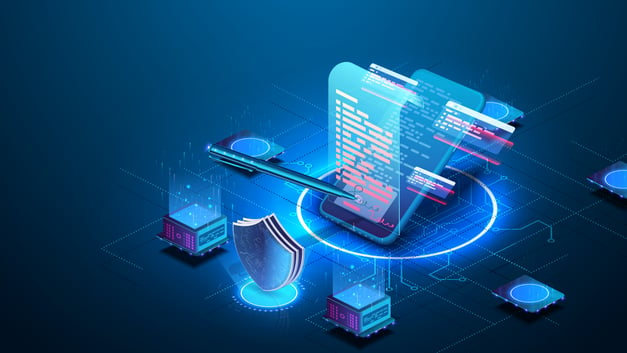Smart contracts represent an exciting application of blockchain technology, one the top legal tech trends in 2021. By adding automated contract negotiation to an existing blockchain contract management solution, a task that may have taken 10 days to complete can be accomplished in minutes. Smart contracts are self-executing, self-enforcing programs stored on a digital ledger, or blockchain, which automates a series of actions as predetermined conditions are met. Many legal departments are beginning to rely on cost-effective digital tools enabling blockchain contract management that can be implemented in-house.

How Blockchain Contract Management Works
A contract blockchain includes conditional “if/when… then…” commands executed by a network of computers upon verification of prearranged stipulations. To establish terms, parties must determine what rules will govern the various transactions, explore all potential exceptions, negotiate mutually favorable terms, and define a framework for settling disputes. Blockchain is the ideal environment for contract provisions, as all stored data are immutable and can never be lost, modified, or deleted. Transactions arising from smart contracts are fully transparent and traceable.
Blockchain Example
Imagine that a shipment of goods from China arrives at an NYC port. Traditionally, the merchant would inspect the goods and pass them through customs. The merchant would then wait for the necessary paperwork to be handled by a broker, pay the required duties, and take physical control of the goods after paying the seller. The merchant would then transfer the goods to the transportation carrier for distribution. All of this would typically take around 10 business days, as long as there were no deviations from the purchase agreement.
With a smart contract powered by blockchain, the merchant scans pallet barcodes when the ship docks. Data uploaded to the blockchain triggers the automated filing of customs declarations and duty payments. Next, the transfer of ownership from the seller to buyer is triggered, as well as all payments between a buyer, seller, and freight carrier. If all conditions are met, this process can be completed in just a few minutes.
Industries Impacted by Smart Contracts
The logistics industry is just one of many potential applications where artificial intelligence (AI) can save companies billions of dollars and countless hours while increasing trust and transparency with customers. Smart contracts are relevant in areas including the following:
In business and technology, blockchain contract management is used in negotiating and executing Non-Disclosure Agreements, License Agreements, Master Service Agreements, as well as Merger and Acquisition Agreements.
What Provisions Can Be Automated in a Blockchain Contract?
A number of automated processes can be triggered in a blockchain contract, including:
- Requests for approvals
- Digital signatures
- Payments
- Interest calculations
- Levying penalties
- Storing information
- Disbursement of goods
Optimizing the Negotiation Process for Blockchain Contract Management With Artificial Intelligence
By automating the contract review and negotiation process with the help of AI, legal departments can optimize the process that establishes the immutable framework for blockchain contract management.
An AI-powered contract negotiation platform can automate the contract review and negotiation process for a wide variety of agreements. After training the AI, legal staff simply upload new contracts to the platform for review. Contracts are returned fully-edited, redlined, and ready for approval.
Leveraging these technologies together can enable leading-edge legal departments to transcend their company’s everyday expectations for efficiency and accuracy in contract management.
LexCheck's AI-powered contract review and negotiation platform can optimize your blockchain contract management process. Contact us at sales@lexcheck.com to learn more. To experience the technology for yourself, request a demo.
.jpg)
